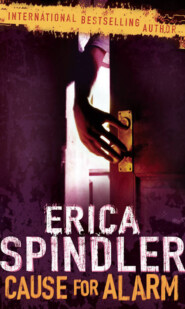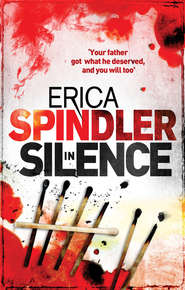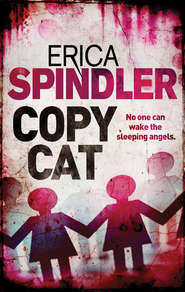По всем вопросам обращайтесь на: info@litportal.ru
(©) 2003-2024.
✖
Killer Takes All
Автор
Год написания книги
2018
Настройки чтения
Размер шрифта
Высота строк
Поля
Stacy looked up to see Detectives Malone and Sciame heading across the coffeehouse toward her. Malone looked really pissed.
He had found out about her visit with Leonardo Noble.
Sorry, fellas. Free country.
“Hello, Detectives,” she said as they neared her table. “Coffee break? Or social call?”
“Impersonating a police officer is a crime, Ms. Killian,” Spencer began.
“I know that.” She smiled sweetly and shut her laptop. “And what does that have to do with me?”
“Don’t bullshit me. We talked to Noble.”
“Leonardo Noble?”
“Of course, Leonardo Noble. Creator of the game White Rabbit and considered by fans to be the Supreme White Rabbit.”
“Glad to see you’ve been paying attention.”
Behind Spencer, Tony cleared his throat. She saw he struggled not to laugh. She decided she liked Tony Sciame. A sense of humor was a good thing in the job.
“Still,” she continued, “I don’t understand what this has to do with me?”
“You told him you were a NOPD detective.”
“No,” she corrected, “he assumed I was. His housekeeper, actually.”
“Which was exactly what you wanted.”
She didn’t deny it. “Last time I checked, that wasn’t against the law. Unless law here in Louisiana is a lot different than in Texas.”
“I could haul you in and charge you with obstruction.”
“But you won’t. Look …” She stood so she could stand nose to nose with him. “You could take me in, keep me for a few hours, give me a hard time. But at the end of the day you wouldn’t arrest me because it wouldn’t stick.”
“She’s got a point, Slick,” Tony said. He shifted his focus to her. “Here’s the deal, Stacy. Can’t have you questioning potential suspects before we do. We need to get ‘em cold, so we can gauge their reactions to our questions. You know this, you were a cop. You know we can’t have you leading a witness. Putting thoughts in their heads that weren’t there before. It taints their testimony. I’d define that as obstruction.”
“I can help,” she said. “And you know it.”
“You don’t have a badge. You’re out of it. Sorry.” She wouldn’t be dissuaded. Not until she felt certain the investigation was on solid footing. But she wasn’t about to let them know that. “Consider me a source, then. Like a snitch.”
Tony nodded, expression pleased. “Good. You get a lead, you pass it to us. I have absolutely no problem with that. You, Slick?”
Stacy cut her eyes to the younger detective. He wasn’t falling for her submissive routine. Smarter than the average bear, after all.
“No problem with that,” he said, not looking at his partner.
“Glad that’s settled.” The older cop rubbed his hands together. “So, what do they have here that’s good?”
“I’m particularly fond of the cappuccinos, but it’s all good.”
“I think I’ll try one of those frozen thingies that all the teenagers are drinking. Want anything?”
Spencer shook his head, still not taking his gaze from Stacy.
“What?” she asked as Tony walked away.
“Why are you doing this?”
“I told you why. At the memorial service.”
“It’s not smart, Stacy. Involving yourself in this investigation. You’re not a cop anymore. You were first to the scene. You very well may have been the last person to see Cassie Finch alive.”
“Surely not the last. That would make me a murderer. And you and I both know I’m not.”
“I know no such thing.”
She made a sound of frustration. “Give me a break, Malone.”
“I have, Stacy. But the game’s over.” He leaned slightly toward her. “The fact is, I’m the law and you’re not. This is the last time I’ll ask nicely. Stay out of my way. “
Stacy watched him walk away, joining his partner just as he took his first sip of the frozen coffee-and-chocolate concoction he’d ordered. She smiled to herself.
May the best investigator win, fellas.
CHAPTER 14
Friday, March 4, 2005 10:30 p.m.
The Earl K. Long Library stood at the center of the UNO campus, facing the quad. Two hundred thousand square feet and four floors, like most buildings at the university, the library had been built in the 1960s.
Stacy sat at a table on the fourth floor. The fourth housed the Multimedia Center, which included microfilm and microfiche, video and audio collections. She’d been researching RPGs since she’d left her afternoon class. Tired and hungry, she sported a splitting headache.
She was loath to go home, anyway. The information she’d uncovered about role-playing games, and White Rabbit in particular, was fascinating.
And disturbing. Article after article linked role-playing games to suicides, death pacts and even murder. Claims from gamers’ parents of dramatic behavior transformation in their children, of obsession with playing so intense they feared for their children’s mental health. A number of parent groups had formed in the attempt to alert others to the dangers of role-playing games and to force manufacturers to label the games with warnings.
The circumstantial evidence against the games had proved so impressive that several politicians had gotten involved in the fray, although to date nothing had come of it.
In all fairness, a number of other researchers discounted such findings, calling them unproved and alarmist. But they, too, acknowledged that in the wrong hands the material could be a powerful tool.
It wasn’t the game that was dangerous, but the obsession with the game.
A variation on Leo Noble’s “Guns don’t kill people, people kill people” schtick.
Stacy brought a hand to her temple and absently rubbed, longing for a cup of strong coffee or a chocolate chip cookie. Each—or both—would knock out her headache. She glanced at her watch. The library closed at eleven; she might as well stick it out until then.
She returned her attention to the material in front of her. The most written-about game was Dungeons & Dragons. It had been first on the market and had remained the most popular. But even though White Rabbit sat way outside the mainstream, Stacy had found several references to the game. One parent group labeled it “unholy,” another “deplorably violent.”











